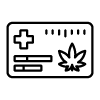Cannabis Laws in Georgia

Fully Legalized for Adult Use?

Fully Legalized for Medical Use?

CBD only?

Decriminalized?
Disclaimer: This information is provided for general informational purposes only and may not reflect the most current legal requirements in Georgia. Cannabislaws.global recommends you consult with a qualified local attorney or legal expert for accurate and up-to-date information. This information is not intended as legal advice and should not be relied upon as such. Use of this information is at your own risk.
Does Georgia have a recreational use program?
No, recreational use is not legal in Georgia. Within the Georgia Controlled Substances Act, marijuana is considered a controlled drug and is not allowed to be used for recreational purposes.
Does Georgia have a medical program?
Yes, medical cannabis is legal in Georgia. However, the state only allows the use of low-THC oil derived from marijuana to help with specific medical conditions.
What are the rules for medical use?
Haleigh’s Hope Act was passed in 2015 to let certain people have and use up to 20 ounces of low-THC oil. On a dry weight scale, low-THC oil has less than 5% THC and at least 5% CBD.
The Act says that people with certain illnesses and medical conditions must be given a certificate by a doctor before they can get low-THC oil treatment.
You need to see a doctor, who will look at your medical history and condition to decide if you are allowed to use low-THC oil. The test has to be done in person. There can’t be any telemedicine exams.
The doctor fills out a waiver form and a certification form during the visit. These are then added to your medical file. The doctor also puts the information from the forms into the Low THC Oil Registry run by the Georgia Department of Public Health.
The DPH will notify you when your application is approved and your registry ID card is ready.
What are the qualifying medical conditions for eligibility?
- AIDS/HIV
- Cancer
- Crohn’s disease
- Tourette’s syndrome
- Seizure disorders
- Alzheimer’s disease
- PTSD
- Unbearable pain
What are the medical program limits?
The scope of Haleigh’s Hope Act is extremely limited. For medical reasons, it doesn’t let people grow marijuana at home. It’s against the law to have marijuana plants or leaves in your possession.
What methods of use are permitted under the medical program?
Tinctures, lotions, pills, transdermal patches, and oil. But cannabis edibles are against the law.
Consuming low-THC oil through food is also illegal, and it can’t be consumed through smoking, vaping, or electronic cigarettes.
Is there home delivery for medical cannabis?
As of now, only low-THC oil is permitted in the state. Georgia has not fully legalized medical marijuana, so it is against the law to distribute or sell it.
There are currently no medical marijuana delivery services in Georgia.
Is CBD legal in Georgia?
Yes, CBD is legal in Georgia. The Georgia state assembly passed House Bill 1, also known as the Haleigh’s Hope Act, in 2015. This law lets people with certain medical conditions use low-THC oil for medical purposes.
According to the law, low-THC oil has less than 5% THC and at least the same amount of CBD by dry weight.
Is cannabis decriminalized in Georgia?
The Georgia Controlled Substances Act lists different punishments for crimes involving marijuana.
It is a crime in Georgia to have up to 1 ounce (28 grams) of marijuana for personal use. You could go to jail for up to 12 months and have to pay a $1,000 fine. Offenders may also get 12 months of community service instead of jail time or fines from the court.
Cannabis possession exceeding 1 ounce is a felony punishable by up to 10 years in prison, with a required minimum of 12 months in prison.
In some Georgia towns, having up to an ounce of marijuana is decriminalized. Fines of $35 to $300 are given to people caught with less than an ounce of marijuana in cities like Athens, Atlanta, Forest Park, South Fulton, Clarkston, Statesboro, Savannah, and Stonecrest. Offenders can also be sent to drug recovery centers or made to go to classes to acquire information about drugs.
Disclaimer: This information is provided for general informational purposes only and may not reflect the most current legal requirements in Georgia. Cannabislaws.global recommends you consult with a qualified local attorney or legal expert for accurate and up-to-date information. This information is not intended as legal advice and should not be relied upon as such. Use of this information is at your own risk.

CannabisLaws.global
Your global guide to cannabis laws

Georgia Legal Aid
contact [email protected] to own this page
